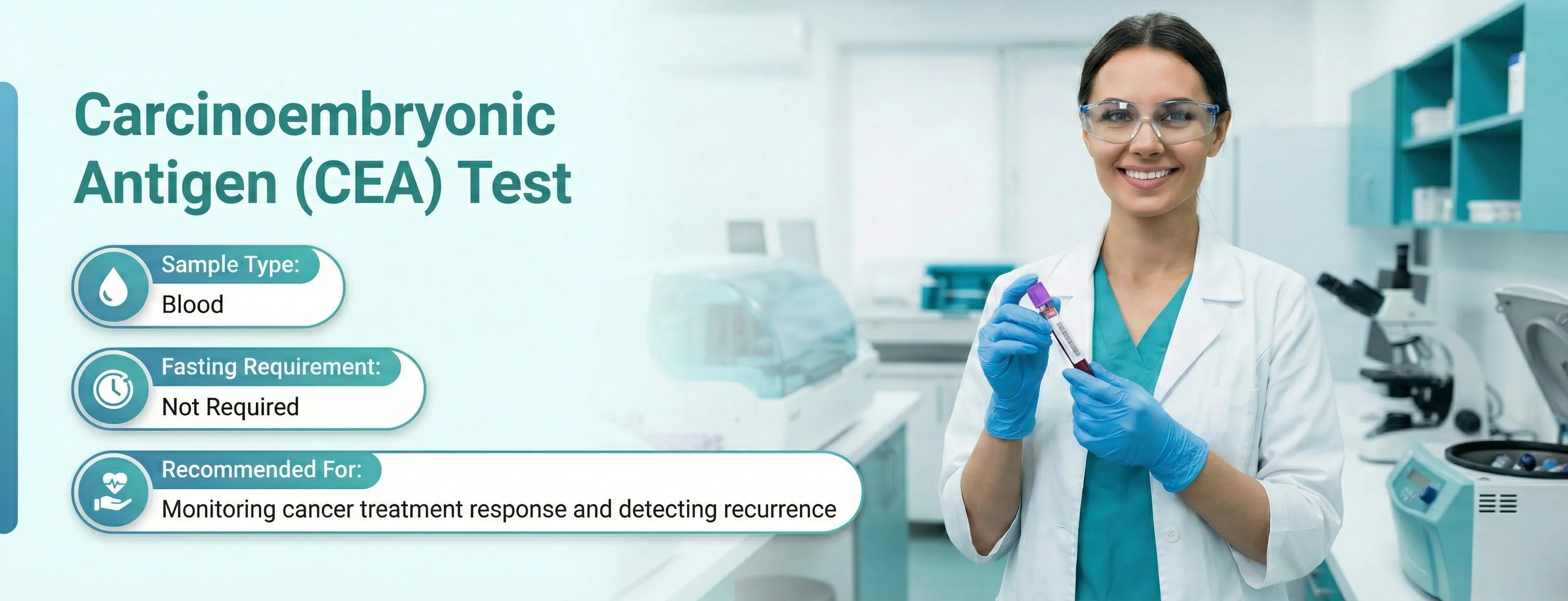210+ orders placed in your location
100% NABL & ISO Certified Lab • 100% Accurate Reports
Carcinoembryonic Antigen (CEA) Test
Embryonic Carcinoma Antigen, Carcinoembryonic Antigen Blood Test, Immunoenzymatic Assay, Carcinoembryonic Ag, CEA, Carcinoembryonic Antigen
- SummaryThe CEA test measures the level of carcinoembryonic antigen, a protein that may be elevated in certain cancers such as colorectal, lung, breast, or pancreatic cancer. It is mainly used to monitor cancer treatment or help detect recurrence, not for initial diagnosis. The test is performed using a blood sample, and fasting is not required, though your doctor may advise avoiding smoking before the test.Read more
- Reports Within14 HrsView Sample Report100% NABL & ISO Certified Labs
- SampleBlood
- AgeAll Age Group
- GenderMale and Female
- FastingNot Required
PharmEasy Promises
Know More About The Test
A quick info on Carcinoembryonic Antigen (CEA) Test
Overview
Carcinoembryonic Antigen (CEA) is a set of glycoproteins involved in cell adhesion (an ability of the body cell to stick to other cells). It is a type of substance through which doctors can detect a tumour in the patient’s body.
CEA is produced right when a baby is growing inside its mother and disappears after birth. Its value is very low at birth or not present. Ideally, it should not be present at all. However, in normal healthy tissues, it can be present in very low levels. The CEA levels may be increased in chronic smokers.
CEA are proteins that are produced by some types of cancer. The CEA test is used to determine the level of efficacy provided by a given treatment employed to detect cancer. In simple words, a CEA test is used to determine how well a particular treatment works in certain types of cancer, specifically colon cancer (cancer in the large intestine).
It can detect colorectal cancer in patients with a sensitivity of ~80%. However, the CEA blood test is not reliable for detecting cancer, especially during the early stages. Most types of cancers do not show high CEA levels.
Colorectal cancer is a colon or rectum cancer situated at the lower end of the digestive tract. Most of the time, it starts as a growth on the inner lining of the colon or rectum. These growths are known as polyps. However, Colorectal cancer might not show signs in the early stages.
High risks for colorectal cancer:
- Family history of the disease
- Animal containing fat diet
- Inflammatory bowel disease
- Tobacco use
CEA test is used for the diagnosis of early detection of liver metastasis (cancer spreading to the liver) in patients with diagnosed colorectal cancer. Despite this, there is very little evidence to believe that the quality of life of a colorectal patient with cancer can be improved, even with early detection and screening.
It is present in around 70 to 80 per cent of advanced colon cancers, but only in about 25 per cent of early-stage colon tumours. Currently, the most useful application of CEA is in the detection of liver metastasis from colorectal cancers.
Besides colorectal cancer, other conditions in which CEA levels are high are:
- Chronic or long-term smoking
- Liver disease
- Inflammatory bowel disease (Crohn’s disease and Ulcerative colitis)
- Ulcers
- Cirrhosis
- Hypothyroidism
- COPD (Chronic Obstructive Pulmonary Disease)
- Infection
- Pregnancy
CEA test is also carried out after surgery to check carcinoembryonic antigen levels. This test helps the doctor check how much CEA is still present in the blood, spinal fluid or peritoneal fluid. It is also a method to assess the effectiveness of chemotherapy and radiotherapy in cancer patients.
CEA levels should be monitored closely by repeated testing to prevent a recurrence. If there is a resurgence in the levels of CEA post-treatment, this might indicate the need for surgical re-exploration.
Sample Type
The CEA test results are based on the analysis of the blood samples. After collecting the blood sample, the laboratory processes the blood to obtain serum and the serum is used for detecting CEA. In some patients, fluid from the spine, abdomen or lungs, respectively, is used to detect CEA.
Risk Assessment
Colorectal cancer, Lung cancer, Breast cancer, Liver cancer
How frequently should you take this test?
A single result for CEA levels is not enough to monitor patients’ condition. Therefore, the doctor will recommend patients for CEA tests before, during and after the treatment.
- CEA test is initially carried out when the patient’s symptoms point towards cancer.
- The doctor will advise their patients regularly to check if the cancer treatments such as chemotherapy, radiation and/or surgery are working.
- Lastly, the doctors will suggest a CEA test post-treatment to check if cancer has come back.
The time gap between two CEA tests varies from patient to patient. For example, in patients with Stage 2 or 3 colon cancer, the doctor will recommend a CEA test every three months. Also, the patient will need to do this test up to three years post-surgery. However, if cancer has spread to other body parts, the doctor will recommend a CEA test every month.
Test Preparation
Before the Test
In general, there is no specific preparation required for an CEA test. However, if this blood test is done in conjunction with another test that necessitates specific preparation, your doctor may recommend avoiding certain foods. Also, smoking may increase CEA levels, so it is advised not to smoke before the test is performed. Kindly seek guidance from your doctor for the best possible outcome.
During the Test
A small amount of blood will be drawn from a vein in your arm. Here's what to expect:
- The expected puncture site will be meticulously cleaned with antiseptic.
- A tourniquet will be secured around your arm to enhance vein visibility.
- A needle will be carefully inserted into the vein to draw the blood, which may cause a brief pinching for a few seconds.
- The collected blood will be placed into a vial or small tube, labeled with your information.
After the Test
Following the blood draw you can expect:
- A bandage will be applied to the needle-insertion area to prevent further bleeding.
- Minor bruising is common. What is uncommon is feeling lightheaded. If you feel dizzy, it is recommended to sit down for a few minutes.
- If you observe any bleeding, pain, or a rash at the site of the needle, please contact your doctor promptly.
Parameters
The CEA test only checks the CEA levels in the blood to monitor the progression of cancers in the digestive tract, breast, lung, reproductive system, urinary system, head and neck, thyroid, lymphoma and melanoma.
Ranges
|
Parameter |
Range (nanograms/millimetre, ng/ml) |
|---|---|
|
Normal range |
0 to 2.5 |
|
Smokers |
0 to 5 |
|
Cancer or benign inflammatory conditions (or both) Cancer Cancer that has metastasized Cancer metastasized to the pleural cavity, peritoneal cavity and central nervous system |
>2.5 (or >5.0 in smokers) > 10 >20 > 100 |
- CEA is very low or not present at birth.
- CEA can be present in adults in lower amounts.
- CEA levels are slightly higher in smokers.
- CEA levels decline about 6-12 weeks after surgery. However, if they still do not go down, this is indicative of recurrence of cancer.
The normal values and reference ranges of the test may vary from lab to lab. Please refer to the ranges mentioned in the report and consult a doctor to understand the interpretation of lab reports.
Test Result Interpretation
- In smokers, slightly higher values may be considered normal (0 to 5 ng/mL), which is an indicator of cancer or inflammatory conditions in non-smokers. A low level of CEA indicates that cancer has still not spread to other body parts.
- Higher values of CES (>20.0 ng/ml) indicate that cancer has metastasized, i.e., cancer has spread from its original place to other parts of the body.
- Some individuals can have CEA values very high (more than 100 ng/ml). This indicates that cancer has spread to the pleural cavity (a thin tissue layer that surrounds the lungs), peritoneal cavity (a layer of tissues that cover abdominal organs) and central nervous system (brain and spinal cord).
Price/Cost
A CEA test can have varying costs depending on the city and the laboratory. Typically, the price for a CEA test falls between INR 559 and INR 1039. Here's a breakdown of the average expenses for a CEA test in select major cities in India:
City | Min Price | Average Price | Max Price |
CEA Test Price in Bengaluru | 559 | 799 | 1039 |
CEA Test Price in Chennai | 559 | 799 | 1039 |
CEA Test Price in Delhi | 559 | 799 | 1039 |
CEA Test Price in Hyderabad | 559 | 799 | 1039 |
CEA Test Price in Kolkata | 559 | 799 | 1039 |
CEA Test Price in Lucknow | 559 | 799 | 1039 |
CEA Test Price in Mumbai | 559 | 799 | 1039 |
CEA Test Price in Nagpur | 559 | 799 | 1039 |
CEA Test Price in Patna | 559 | 799 | 1039 |
CEA Test Price in Pune | 559 | 799 | 1039 |
Risks and Limitations
The CEA test is a conventional blood test that is unlikely to trigger complications. But contact your physician immediately if you experience the following problems:
- Continuous bleeding from the needle insertion site.
- Pain or swelling at the site of blood collection.
Limitations of the test
- Intervention in the outcomes of tests by errors from the equipment or humans.
- Wrong understanding of the markers.
Was This Test Information Helpful?
Please rate your experience
References
People Also Ask
What happens during a CEA test?
When should the CEA test be done?
What do the CEA test results mean?
What does it mean if you have a high Carcinoembryonic Antigen level in your blood?
If CEA levels rise, what should be the course for treatment?
Popular Tests
Have any doubts? Ask us.
Ask us anything about the Carcinoembryonic Antigen (CEA) Test to understand it better
We provide trusted, expert-curated health content to support better awareness,prevention, and care.
Backed by experienced doctors, medical experts, and strict editorial standards.


